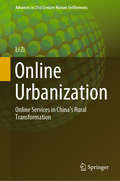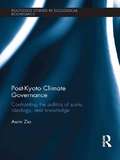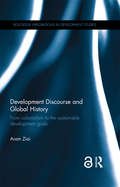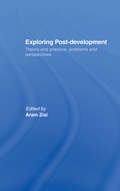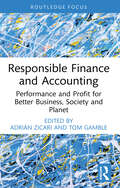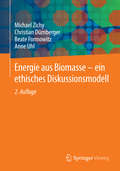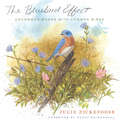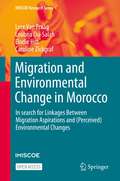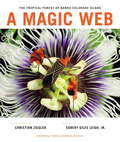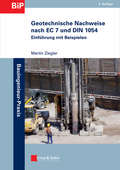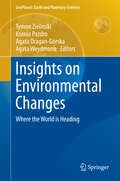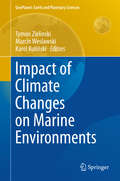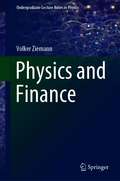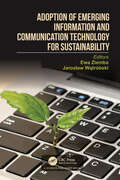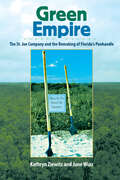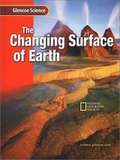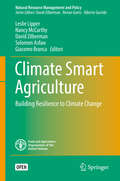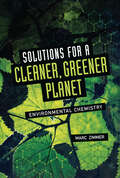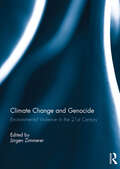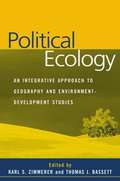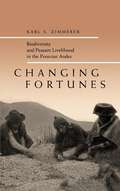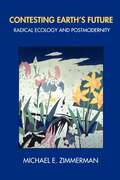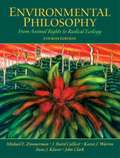- Table View
- List View
Online Urbanization: Online Services in China’s Rural Transformation (Advances in 21st Century Human Settlements)
by Li ZiThis book highlights the new urban–rural relationship that has emerged under the influence of e-commerce in China. In this regard, it presents case studies on the Suichang rural e-commerce model and Alibaba’s rural strategy, together with analyses of online service in China. Furthermore, by means of a brief review of the urban–rural relationship throughout China’s history, and of academic literature on the study of space, it explains the special logic of urbanization in China. As such, the book makes a valuable contribution to the body of literature on the space of flows and grassrooting, aspects that are essential to appreciating the complexity of the new urban–rural relationship in underdeveloped areas (including developing countries and underdeveloped areas in developed countries) in the ongoing information era.
Post-Kyoto Climate Governance: Confronting the Politics of Scale, Ideology and Knowledge (Routledge Studies in Ecological Economics #27)
by Asim ZiaIn the midst of human-induced global climate change, powerful industrialized nations and rapidly industrializing nations are still heavily dependent on fossil fuels. Even if we arrive at a Hubbert’s peak for oil extraction in the 21st century, the availability of technologically recoverable coal and natural gas will mean that fossil fuels continue to be burned for many years to come, and our civilization will have to deal with the consequences far into the future. Climate change will not discriminate between rich and poor nations, and yet the UN-driven process of negotiating a global climate governance regime has hit serious roadblocks. This book takes a trans-disciplinary perspective to identify the causes of failure in developing an international climate policy regime and lays out a roadmap for developing a post-Kyoto (post-2012) climate governance regime in the light of lessons learned from the Kyoto phase. Three critical policy analytical lenses are used to evaluate the inherent complexity of designing post-Kyoto climate policy: the politics of scale; the politics of ideology; and the politics of knowledge. The politics of scale lens focuses on the theme of temporal and spatial discounting observed in human societies and how it impacts the allocation of environmental commons and natural resources across space and time. The politics of ideology lens focuses on the themes of risk and uncertainty perception in complex, pluralistic human societies. The politics of knowledge lens focuses on the themes of knowledge and power dynamics in terms of governance and policy designs, such as marketization of climate governance observed in the Kyoto institutional regime.
Development Discourse and Global History: From colonialism to the sustainable development goals (Routledge Explorations in Development Studies)
by Aram ZiaiThe manner in which people have been talking and writing about ‘development’ and the rules according to which they have done so have evolved over time. Development Discourse and Global History uses the archaeological and genealogical methods of Michel Foucault to trace the origins of development discourse back to late colonialism and notes the significant discontinuities that led to the establishment of a new discourse and its accompanying industry. This book goes on to describe the contestations, appropriations and transformations of the concept. It shows how some of the trends in development discourse since the crisis of the 1980s – the emphasis on participation and ownership, sustainable development and free markets – are incompatible with the original rules and thus lead to serious contradictions. The Eurocentric, authoritarian and depoliticizing elements in development discourse are uncovered, whilst still recognizing its progressive appropriations. The author concludes by analysing the old and new features of development discourse which can be found in the debate on Sustainable Development Goals and discussing the contribution of discourse analysis to development studies. This book is aimed at researchers and students in development studies, global history and discourse analysis as well as an interdisciplinary audience from international relations, political science, sociology, geography, anthropology, language and literary studies.
Exploring Post-Development: Theory and Practice, Problems and Perspectives (Routledge Studies in Human Geography)
by Aram ZiaiTackling issues surrounding post-development which is arguably one of the most significant debates in the field of north-south relations at the beginning of the twenty-first century. Contributors explore the possibilities and limitations of post-development theory and practice drawing on empirical studies of movements and communities in several continents.
Responsible Finance and Accounting: Performance and Profit for Better Business, Society and Planet (Routledge COBS Focus on Responsible Business)
by Adrián Zicari Tom GambleThe UN Sustainable Development Goals, an increasing interest in Environmental, Social, and Governance factors, the climate crisis, stakeholder pressure, the lessons of corporate scandals, and the COVID-19 pandemic have triggered a massive change in how companies approach finance and accounting practices. From being a ‘nice-to-have’ to becoming a ‘must-have’, Responsible Finance and Accounting positions itself as a key pillar in tomorrow’s better world for business, society, and planet. In this book, leading researchers and practitioners in the field of corporate social responsibility, from the schools and corporate partners of the Council on Business & Society, give you key insights into green finance and social and environmental reporting, national, international and corporate stakes in green taxonomy and carbon tax, and triple capital accounting. It also details how to model effective and low-cost social impact reporting, ethics in finance and accounting, and strategies for microfinance and finance-related social innovation. Each insight is accompanied by key takeaways, food for thought, and micro-case study sections. This accessible book will be a valuable resource for scholars, instructors, and upper-level students across finance and accounting as well as corporate social responsibility and business ethics. It will also serve as a guide for professionals aiming to deepen their understanding of new finance and accounting practice.
Energie aus Biomasse - ein ethisches Diskussionsmodell
by Michael Zichy Christian Dürnberger Beate Formowitz Anne UhlEnergie aus Biomasse wird auf politischer, wissenschaftlicher und gesellschaftlicher Ebene höchst kontrovers diskutiert. – Dieses Buch liefert eine fundierte, klare und gut verständliche Analyse und Diskussion der ethischen und kulturell-emotionalen Aspekte von Energie aus Biomasse. Es diskutiert die Frage der Verantwortung und bringt naturwissenschaftliche und ethische Expertise in einen fruchtbaren Dialog. Vergleichende Fallstudien und Szenarien sorgen für die praktische Anbindung an die derzeitige landwirtschaftliche Praxis. Die zweite, überarbeitete Auflage bezieht sich auf die aktuellen gesetzlichen Rahmenbedingungen und berücksichtig die neuesten wissenschaftlichen Beiträge zum Diskurs, wie zum Beispiel zu indirekten Landnutzungsänderungen.
The Bluebird Effect
by Julie ZickefooseJulie Zickefoose lives for the moment when a wild, free living bird that she has raised or rehabilitated comes back to visit her; their eyes meet and they share a spark of understanding. Her reward for the grueling work of rescuing birds--such as feeding baby hummingbirds every twenty minutes all day long--is her empathy with them and the satisfaction of knowing the world is a birdier and more beautiful place.The Bluebird Effect is about the change that's set in motion by one single act, such as saving an injured bluebird--or a hummingbird, swift, or phoebe. Each of the twenty five chapters covers a different species, and many depict an individual bird, each with its own personality, habits, and quirks. And each chapter is illustrated with Zickefoose's stunning watercolor paintings and drawings. Not just individual tales about the trials and triumphs of raising birds, The Bluebird Effect mixes humor, natural history, and memoir to give readers an intimate story of a life lived among wild birds.
Migration and Environmental Change in Morocco: In search for Linkages Between Migration Aspirations and (Perceived) Environmental Changes (IMISCOE Research Series)
by Caroline Zickgraf Lore Van Praag Loubna Ou-Salah Elodie HutThis open access book studies the migration aspirations and trajectories of people living in two regions in Morocco that are highly affected by environmental change or emigration, namely Tangier and Tinghir, as well as the migration trajectories of immigrants coming from these regions currently living in Belgium. This book departs from the development of a new theoretical framework on the relationship between environmental changes and migration that can be applied to the Moroccan case. Qualitative research conducted in both countries demonstrate how the interplay between migration and environmental factors is not as straightforward as it seems, due to its wider social, political, economic, demographic and environmental context. Findings show how existing cultures of migration, remittances, views on nature and discourses on climate change create distinct abilities, capacities and aspirations to migrate due to environmental changes. The results illustrate how migration and environmental factors evolve gradually and mutually influence each other. In doing so, this book offers new insights in the ways migration can be seen as an adaptation strategy to deal with environmental change in Morocco.
A Magic Web
by Christian Ziegler Egbert Giles LeighThe tropical forest of Panama's Barro Colorado Island is a luxuriant community of plants and animals, pulsating with life and offering an astonishing view of nature's myriad processes. What does the forest look like? How do the activities of the forest's plants and animals create a community?In A Magic Web, photographer Christian Ziegler and evolutionary biologist Egbert Giles Leigh, Jr., invite readers to enter the marvelous world of Barro Colorado Island. This book is a unique combination of spectacular photography and clear, authoritative text written by an active scientist who has spent half a lifetime trying to understand the tropical forest. Luscious photographs of the forest reveal the wonderful diversity of its inhabitants and show many of the activities that give it its character and lend structure to its community. Drawing on decades of work on Barro Colorado Island, Egbert Leigh explains how the forest works: how plants and animals compete with but also depend on each other; how the solitary lives of cats contrast with the intricately organized lives of armies of ants; the variety of ways plants struggle for a place in the sun; and how these plants attract animals to pollenate their flowers. Finally, the book shows the importance of tropical forests to the people living near them, why they matter to the world at large, what we can learn from them, and how they differ from temperate-zone forests.Full of stunning full-color photographs accompanied by clear and accessible text, A Magic Web is a must for anyone planning to visit a tropical forest and for all those who wish they could.
Geotechnische Nachweise nach EC 7 und DIN 1054: Einführung in Beispielen (Bauingenieur-Praxis)
by Martin Zieglerwww.ernst-und-sohn.de Mit der Veröffentlichung der deutschen Fassung des Eurocodes 7-1: Entwurf, Berechnung und Bemessung in der Geotechnik – Teil 1: Allgemeine Regeln als DIN EN 1997-1:2009 und des zugehörigen Nationalen Anhangs DIN EN 1997-1/NA:2010 mit den Ergänzenden Regelungen in DIN EN 1054:2010 liegt das geschlossene neue europäische Normenwerk für die Sicherheitsnachweise im Erd- und Grundbau nun für die Anwendung in Deutschland vor. Die in einem Normenhandbuch zusammengefassten Regelungen ersetzen die bisherige DIN 1054:2005. In dem vorliegenden Buch werden die Grundlagen und Begriffe der Nachweisführung vorgestellt. Soweit nötig wird dabei auch auf die mit geltenden Normen und Empfehlungen wie die Geländebruchnorm DIN 4084 oder die Erddrucknorm DIN 4085 sowie die EAB, EAU, EA-Pfähle und die EBGEO eingegangen. Die erforderlichen Nachweise werden erläutert und anhand von Ablaufdiagrammen und zahlreichen Beispielen verdeutlicht. Dabei werden alle gängigen geotechnischen Aufgaben wie Flächengründungen, Pfahlgründungen, Baugrubenwände, Verankerungen, Stützbauwerke sowie die Versagensformen durch Grundbruch, Geländebruch und hydraulisch bedingtes Versagen angesprochen. Im Juli 2012 sollen die Eurocodes ohne Übergangsfrist bauaufsichtlich eingeführt werden. Die Beispielsammlung im Buch ermöglicht einen schnellen Einstieg in das neue Normenwerk und bildet so für Geotechniker und Bauingenieure ein unverzichtbares Hilfsmittel bei der Anwendung des Regelwerks in der praktischen Tätigkeit.
Insights on Environmental Changes
by Tymon Zielinski Ksenia Pazdro Agata Dragan-Górska Agata WeydmannThis book presents valuable insights on a vast array of topics in the field of environmental studies. The works published in the book were presented within the scope of the 2013 Sopot Forum of Young Scientists. The Forum is an annual event which provides a platform for young researchers to present their work and exchange ideas with their peers. The aim of the forum is to make science more popular, so the speakers talked about their work in a way that was easily understandable. The book contains actual scientific papers on their own topics of interest. The papers represent different areas of environmental sciences, from biology to physics. The main umbrella topic for this book is "WHERE THE WORLD IS HEADING" and the papers are constructed in such a way as to try to answer this from each contributor's individual perspective.
Impact of Climate Changes on Marine Environments
by Tymon Zielinski Marcin Weslawski Karol KulińskiThis book contributes to the current discussion on global environmental changes by discussing modifications in marine ecosystems related to global climate changes. In marine ecosystems, rising atmospheric CO2 and climate changes are associated with shifts in temperature, circulation, stratification, nutrient input, oxygen concentration and ocean acidification, which have significant biological effects on a regional and global scale. Knowing how these changes affect the distribution and abundance of plankton in the ocean currents is crucial to our understanding of how climate change impacts the marine environment. Ocean temperatures, weather and climatic changes greatly influence the amount and location of nutrients in the water column. If temperatures and currents change, the plankton production cycle may not coincide with the reproduction cycle of fish. The above changes are closely related to the changes in radiative forcing, which initiate feedback mechanisms like changes in surface temperature, circulation, and atmospheric chemistry.
Physics and Finance (Undergraduate Lecture Notes in Physics)
by Volker ZiemannThis book introduces physics students to concepts and methods of finance. Despite being perceived as quite distant from physics, finance shares a number of common methods and ideas, usually related to noise and uncertainties. Juxtaposing the key methods to applications in both physics and finance articulates both differences and common features, this gives students a deeper understanding of the underlying ideas. Moreover, they acquire a number of useful mathematical and computational tools, such as stochastic differential equations, path integrals, Monte-Carlo methods, and basic cryptology. Each chapter ends with a set of carefully designed exercises enabling readers to test their comprehension.
Physik und Finanzen
by Volker ZiemannDieses Buch führt Physikstudenten in die Konzepte und Methoden der Finanzwissenschaft ein. Obwohl die Finanzwissenschaft als recht weit von der Physik entfernt wahrgenommen wird, teilt sie eine Reihe gemeinsamer Methoden und Ideen, die in der Regel mit Rauschen und Unsicherheiten zu tun haben. Durch die Gegenüberstellung der wichtigsten Methoden mit Anwendungen in der Physik und im Finanzwesen werden sowohl die Unterschiede als auch die Gemeinsamkeiten deutlich, was den Studierenden ein tieferes Verständnis der zugrunde liegenden Ideen vermittelt. Darüber hinaus lernen sie eine Reihe nützlicher mathematischer und rechnerischer Werkzeuge kennen, wie stochastische Differentialgleichungen, Pfadintegrale, Monte-Carlo-Methoden und grundlegende Kryptologie. Jedes Kapitel endet mit einer Reihe sorgfältig ausgearbeiteter Übungen, mit denen die Leser ihr Verständnis überprüfen können.
Adoption of Emerging Information and Communication Technology for Sustainability
by Ewa Ziemba JarosławThis book represents an important voice in the discourse on the adoption of emerging ICT for sustainability. It focuses on how emerging ICT acts as a crucial enabler of sustainability, offering new forward-looking approaches to this field. The book explores how emerging ICT adoption drives sustainability efforts in business and public organizations, promoting ecological, economic, social, cultural, and political sustainability. The book's theoretical discussions, conceptual approaches, empirical studies, diverse perspectives, and views make it a valuable and comprehensive reference work. Appealing to both researchers and practitioners, this book provides significant areas for research and practice related to the contribution of emerging ICT adoption to sustainability. It also suggests vital considerations for programming and building sustainable development-driven emerging ICT adoption. Readers will find answers to important contemporary questions, such as: What are the concepts, frameworks, models, and approaches to enhance sustainable development through the adoption of emerging ICT? How does the adoption of emerging ICT influence sustainability? How can emerging ICT be adopted to enhance sustainability? What are the current practices and successful cases of emerging ICT adoption for sustainability? What factors influence emerging ICT adoption to enhance sustainability?
Green Empire: The St. Joe Company and the Remaking of Florida's Panhandle
by Kathryn Ziewitz June WiazSince the Great Depression, the St. Joe Company (formerly the St. Joe Paper Company) has been Florida's largest landowner, a forestry and transportation conglomerate whose influence has been commensurate with its holdings. The company owns nearly one million acres, mainly in northwestern Florida, where undeveloped coastal and riverside landscapes boast some of the state's most scenic and ecologically diverse areas. For 60 years, the company focused on growing trees, turning them into paper, and managing its ancillary businesses. In the late 1990s, the company shifted directions: it sold its paper mill, changed its name, and launched a concerted drive to turn its natural-resource assets into greater profits. Today the St. Joe Company is a critical and fiscally powerful force in the real-estate development of northwest Florida, with access to the most influential people in government. Based on hundreds of sources--including company executives, board members, and investors, as well as outside observers--this factual and balanced history describes the St. Joe Company from the days of its founders to the workings and dealings of its present-day heirs. For anyone concerned with land use and growth management, particularly those with an interest in Florida's fragile wildlife and natural resources, Green Empire will illuminate the issues surrounding the relationship between one of the most ambitious players in Florida's real-estate market and the state's last frontier.
Glencoe Science: The Changing Surface of Earth
by Dinah Zike Ralph M. Feather Susan Leach SnyderThis book is one of Glencoe Science's series. Students learn about the Earth's formation, erosion and weathering. In each chapter it provides Web Links, Standardized Test Practice, Chapter Review Quizzes-Eng., Chapter Review Quizzes-Sp., Interactive Tutor, Concept Animations, Virtual Lab, Math Practice.
Climate Smart Agriculture: Building Resilience to Climate Change (Natural Resource Management and Policy #52)
by David Zilberman Leslie Lipper Nancy Mccarthy Solomon Asfaw Giacomo BrancaThis book is open access under a CC BY-NC-SA 3. 0 IGO license. The book uses an economic lens to identify the main features of climate-smart agriculture (CSA), its likely impact, and the challenges associated with its implementation. Drawing upon theory and concepts from agricultural development, institutional, and resource economics, this book expands and formalizes the conceptual foundations of CSA. Focusing on the adaptation/resilience dimension of CSA, the text embraces a mixture of conceptual analyses, including theory, empirical and policy analysis, and case studies, to look at adaptation and resilience through three possible avenues: ex-ante reduction of vulnerability, increasing adaptive capacity, and ex-post risk coping. The book is divided into three sections. The first section provides conceptual framing, giving an overview of the CSA concept and grounding it in core economic principles. The second section is devoted to a set of case studies illustrating the economic basis of CSA in terms of reducing vulnerability, increasing adaptive capacity and ex-post risk coping. The final section addresses policy issues related to climate change. Providing information on this new and important field in an approachable way, this book helps make sense of CSA and fills intellectual and policy gaps by defining the concept and placing it within an economic decision-making framework. This book will be of interest to agricultural, environmental, and natural resource economists, development economists, and scholars of development studies, climate change, and agriculture. It will also appeal to policy-makers, development practitioners, and members of governmental and non-governmental organizations interested in agriculture, food security and climate change.
Waves
by Herbert S. ZimThis book talks about anything you ever wanted to know about waves, from how they are formed, explaining simple vocabulary about waves, how they travel across the oceans, how they can be destructive, and how they can be useful too. Although this book was published in 1967 I found it had some excellent information on a topic not often talked about, Ocean waves. Good read in my opinion.
Solutions for a Cleaner, Greener Planet: Environmental Chemistry
by Marc ZimmerMany of the most toxic materials on Earth—from arsenic to plutonium—occur naturally, but manufacturers have also used them in products such as paints, plumbing, pesticides, nuclear fuel, and weaponry. Without careful management, toxins can leach into groundwater or pollute our environment. Exposure to toxins leads to various cancers, impairment of the immune and reproductive systems, as well as cognitive problems. What can be done? Solutions include a wide range of infrastructure approaches, such as better water filtration, governmental and manufacturing regulations, outright bans on certain chemicals, careful monitoring, and the use of alternative fuels. Learn more about key contaminants and their impact on health, as well as solutions on a global and individual level.
Climate Change and Genocide: Environmental Violence in the 21st Century
by Jürgen ZimmererClimate change caused by human activity is the most fundamental challenge facing mankind in the 21st century, since it will drastically alter the living conditions of millions of people, mainly in the Global South. Environmental violence, including resource crises such as peak fossil fuel, will lie at the heart of future conflicts. However, Genocide Studies have so far neglected this subject, due to the emphasis that traditional genocide scholarship places on ideology and legal prosecution, leading to a narrow understanding of the driving forces of genocide. This books aims at changing this, initiating a dialogue between scholars working in the areas of climate change and genocide. Research into genocide as well as climate change is a highly interdisciplinary endeavour, transcending the boundaries of established disciplines. Contributions to this book address this by approaching the subject from a wide array of methodological, theoretical, disciplinary and regional perspectives. As all the contributions show, climate change is a major threat multiplier for violence or non-violent destruction and any understanding of prevention needs to take this into account. They offer a basis for much needed Critical Prevention Studies, which aims at sustainable prevention.This book was originally published as a special issue of the International Journal of Human Rights.
Political Ecology
by Karl Zimmerer Thomas J. BassettThis volume offers a unique, integrative perspective on the political and ecological processes shaping landscapes and resource use across the global North and South. Twelve carefully selected case studies demonstrate how contemporary geographical theories and methods can contribute to understanding key environment-and-development issues and working toward effective policies. Topics addressed include water and biodiversity resources, urban and national resource planning, scientific concepts of resource management, and ideas of nature and conservation in the context of globalization. Giving particular attention to evolving conceptions of nature-society interaction and geographical scale, an introduction and conclusion by the editors provide a clear analytical focus for the volume and summarize important developments and debates in the field.
Changing Fortunes: Biodiversity and Peasant Livelihood in the Peruvian Andes (California Studies in Critical Human Geography #1)
by Karl S. ZimmererTwo of the world's most pressing needs—biodiversity conservation and agricultural development in the Third World—are addressed in Karl S. Zimmerer's multidisciplinary investigation in geography. Zimmerer challenges current opinion by showing that the world-renowned diversity of crops grown in the Andes may not be as hopelessly endangered as is widely believed. He uses the lengthy history of small-scale farming by Indians in Peru, including contemporary practices and attitudes, to shed light on prospects for the future. During prolonged fieldwork among Peru's Quechua peasants and villagers in the mountains near Cuzco, Zimmerer found convincing evidence that much of the region's biodiversity is being skillfully conserved on a de facto basis, as has been true during centuries of tumultuous agrarian transitions.Diversity occurs unevenly, however, because of the inability of poorer Quechua farmers to plant the same variety as their well-off neighbors and because land use pressures differ in different locations. Social, political, and economic upheavals have accentuated the unevenness, and Zimmerer's geographical findings are all the more important as a result. Diversity is indeed at serious risk, but not necessarily for the same reasons that have been cited by others. The originality of this study is in its correlation of ecological conservation, ethnic expression, and economic development.
Contesting Earth's Future: Radical Ecology and Postmodernity
by Michael E. ZimmermanRadical ecology typically brings to mind media images of ecological activists standing before loggers' saws, staging anti-nuclear marches, and confronting polluters on the high seas. Yet for more than twenty years, the activities of organizations such as the Greens and Earth First! have been influenced by a diverse, less-publicized group of radical ecological philosophers. It is their work—the philosophical underpinnings of the radical ecological movement—that is the subject of Contesting Earth's Future.The book offers a much-needed, balanced appraisal of radical ecology's principles, goals, and limitations. Michael Zimmerman critically examines the movement's three major branches—deep ecology, social ecology, and ecofeminism. He also situates radical ecology within the complex cultural and political terrain of the late twentieth century, showing its relation to Martin Heidegger's anti-technological thought, 1960s counterculturalism, and contemporary theories of poststructuralism and postmodernity.An early and influential ecological thinker, Zimmerman is uniquely qualified to provide a broad overview of radical environmentalism and delineate its various schools of thought. He clearly describes their defining arguments and internecine disputes, among them the charge that deep ecology is an anti-modern, proto-fascist ideology. Reflecting both the movement's promise and its dangers, this book is essential reading for all those concerned with the worldwide ecological crisis.
Environmental Philosophy: From Animal Rights to Radical Ecology
by Michael E. Zimmerman J. Baird Callicott John Clark Irene J. Klaver Karen J. WarrenEdited by leading experts in contemporary environmental philosophy, this anthology features the best available selections that cover the full range of positions within this rapidly developing field. Divided into four sections that delve into the vast issues of contemporary Eco-philosophy, the Fourth Edition now includes a section on Continental Environmental Philosophy that explores current topics such as the social construction of nature, and eco-phenomenology. Each section is introduced and edited by a leading philosopher in the field. For professionals with a career within the environmental field including law, politics, conservation, geography, and biology.
